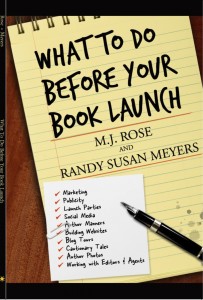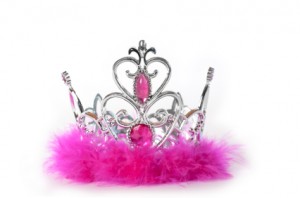What to expect when you’re expecting your book? What’s going to happen first, and second, and third? Pre-launch of my debut novel, the breadth of information I had to learn overwhelmed me—were there an eight-day week into which I could tap.
During the 2-24 months between signing a book contract and receiving those freshly pressed books, there is much to do and little guidance available. In 2009, I turned to the underground for the secrets of debuting, where surreptitious bands of first-timers came together in the shadows to share the secrets they’ve learned from already published brethren.

I found sister-wives (and husbands) – 99% of us scared of asking too many questions of our frightening publishers. (What if they snatched away the opportunity? Only printed four books! Hated us!!!)
That’s what drove me (as I signed the contract for novel # 2 ) to collaborate on the guidebook, What To Do Before Your Book Launch with M.J. Rose, author extraordinaire, marketing guru (principal of Author Buzz,) and, best of all, a close friend. (A chance to work a bit less solo—but still in my official author sweatpants.)
We saw that while there were tons of great books on publicity, marketing, ‘how to’s’ on everything from getting an agent to publishing without one, there was a missing piece: what to do when you actually catch the gold ring of a publishing contract? We felt the need for a guide for authors, covering everything from working with your publisher, to reading in public, to help for publicity and marketing, to using (and misusing) social media, to how to dress for your author photo . . . and far more, including cautionary tales, worksheets, timelines and even. . .
 Manners & Etiquette for Writers (from What to Do Before your Book Launch:)
Manners & Etiquette for Writers (from What to Do Before your Book Launch:)
1) I am certain there are a number of snappish authors who advocate that dogs-should-eat-dogs, who have managed to hit every bestseller list, but I believe in nice. I recommend that ‘nice’ (which, by the way, is entirely unlike being a doormat) color your launch.
2) Get into training now. Answer your mail. All of it. When you receive a compliment, say thank you. (I remember getting When a reader complains that you are biased, don’t rant at your accuser (especially in public!). Ignore them or try to answer thoughtfully. I answered one such email to an angry woman who’d written to me because she thought I’d been disrespectful at one point in my book, and received a more rational answer. We actually found some common ground.
3) Don’t be self-important. I’ve read postings by debut authors complaining about the letters they receive. God, I can’t believe what these people write to me. They want me to send a book! They want a signature! They want me to speak to their class!!
Perhaps this public complaining is a way of showing off how Very Important one has become. Or perhaps they really are stretched to the limit. Hey, every job has its down side, but do you want your doctor online writing about how disgusting she found your rash?
We’ve written books—we haven’t become queens and kings of the world.
4) Don’t grumble in public. Especially in print. Never online. And never about your fellow writers. (Unless you are looking to build a reputation contingent on your cruel wit. Some do. This is not recommended for the average sarcastic person—you must be at doctorate level of nasty and anti-social enough to pull this off this snarky persona.)

5) Unless you are writing a professional review, if you don’t like something, keep it to yourself. I never post a negative review on Amazon or Goodreads, or anywhere else. Not because I’m too wimpy for honesty, but because there are enough professional and amateur critics out there and I know how much even the best-intentioned criticism can hurt, and I don’t want to add one more bad word. I either give five-stars or I don’t do anything. And trust me—writers notice. When I receive a 4-star review on Amazon from someone I know, oh, I notice. (And if it’s someone I helped? Well, never underestimate the thin skin or pettiness of your fellow writers/me.
6. Do you plan to write about your life as an author? Readers—and you are seeking readers, folks, not just the guffaws of your fellow writers—don’t want to hear complaints about how tired you are, how much you hate writing, and what a grind revision is. It’s better not to show how the sausage is made. Dazzle readers with great writing; don’t depress them with what is properly meant for your therapist’s ears.
7. The proper audience for swearing about critics, cursing about Amazon reviews, or sneering at the efforts of more successful writers is your trusted team of writer-friends. And if you have complaints about your treatment at the hands of your publisher, take them to your agent.
8. Don’t, don’t, don’t whine in public! You have published a book. This is a fantastic feat. Let people that you’re happy and grateful if you don’t want to seem like a total brat.
9. Don’t forget to thank your agent, editor, copy-editor, cover designer—everyone. Flowers, candy, and bagels are all nice. Paperweights. Wine. Etsy is a perfect source for unique gifts.
10. Readers don’t limit themselves to just one book. (Not even yours.) If you are a writer, you are probably also an avid reader. Publicly praise great books you read. Use Facebook and Twitter to spread good words about other writers. Promote their books—even ones that come out the exact same week as yours. It’s good karma. You can’t expect help if you don’t provide it to others. And it’s nice. Just like Grandma said.



